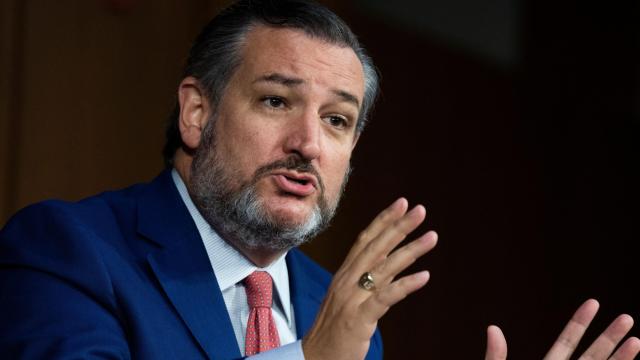This week, Texas Gov. Greg Abbott said he will make Texas the number one state for bitcoin. What’s more, he espoused the wonders of crypto mining as a way to prop up the state’s flailing electrical grid, a view Cancun-loving Sen. Ted Cruz also shared at a bitcoin mining conference last week. It’s a seductive story: magical internet money saving the state from another deadly blackout. But the reality is much more complicated.
A group of very on-brand-looking bitcoin miners descending on the governor’s mansion in Austin on Wednesday. That same day, Abbott announced a plan to drop cryptocurrency machines into more than two dozen grocery stores. Apparently, the meeting went well.
“The Texas grid will be stronger & more resilient as a result of flexible loads like BTC mining that generate demand but can turn off in seconds during peak demand,” Lee Bratcher, president of the Texas Blockchain Council, said of the meeting on Twitter.
Cruz parroted a very similar line last week. “Because of the ability of bitcoin mining to turn on or off instantaneously, if you have a moment where you have a power shortage or a power crisis, whether it’s a freeze or some other natural disaster where power generation capacity goes down, that creates the capacity to instantaneously shift that energy to put it back on the grid,” he said at the Texas Blockchain Summit.
This idea that bitcoin can “strengthen the grid’s resilience,” as Cruz went on to say, would be welcome in a state where the grid failed in spectacular fashion during a February cold snap and regularly strains to meet demand during crushing summer heat waves. But in reality, bitcoin isn’t going to save the state’s energy infrastructure.
Texas’ power grid is absurdly deregulated. It’s run like an auction: Generators set bid prices to sell power to the grid, and the Electric Reliability Council of Texas, accepts the bids starting with the lowest and then working upward until it has enough power to meet demand. More bitcoin mining in Texas would increase demand for electricity. Except instead of running air conditioning in a heat wave, that demand is for something totally nonessential outside the circle of bitcoin evangelists. For an already stressed grid, that seems like a bad idea.
The idea Abbott and Cruz are pushing is that the ability for non-essential energy users to go offline when needed could be helpful. But the problem in Texas wasn’t just increased demand; it was also a total lack of preparation due to deregulation. There are very few rules for producers, so profit-making is the operative principle, which was a key reason the February blackouts occurred. Companies didn’t weatherize their infrastructure in an effort to keep costs down and profits high. Bitcoin miners do nothing to solve that issue.
It’s also unclear why cryptocurrency miners would ever agree to shut down operations unless they were offered lots of money to do so. Some crypto miners are, indeed, scoring wild profits by going offline during peak demand and selling their allocated energy supply back to the grid. That’s great for the bitcoin miners, but it could be awful for everyone else if they have to shoulder that cost. In February, generators brought more power online but charged outrageous prices. In the end, ordinary people had to pay for it in the form of five-figure energy bills for the month.
How much money would it take to convince miners to shut down operations given that being online is the only way to make money? ArsTechnica did a back-of-the-envelope calculation based on the energy it takes to mine a bitcoin and its value versus the maximum fee power plant operators can charge ERCOT:
But brushing those concerns aside, bitcoin miners would likely demand even more than the current $US9,000 ($12,130) per MWh cap. One bitcoin currently sells for $US57,000 ($76,825), and to crunch the numbers to win that one bitcoin, mining rigs draw just under 0.285 MWh, based on Digiconomist estimates. In other words, for bitcoin miners to be willing to contribute to the grid, wholesale electricity prices would have to hit $US206,000 ($277,647) per MWh, or nearly 23 times greater than prices during the February cold snap. Those $US10,000 ($13,478) bills would turn into $US230,000 ($309,994) bills.
There’s another problem with bringing more crypto to Texas: It could give the state an excuse to keep dirty power online. In Upstate New York, for instance, an offline coal plant was brought back to life to run on natural gas and mine bitcoin (and occasionally generate power for the grid). For a state where fossil fuel interests are so entrenched, you can bet coal, oil, and gas producers and their friends in government will take any opportunity to keep dirty energy sources alive even if it fries the climate.
It’s clear that Texas’ grid needs help, but bitcoin isn’t the answer. More democratic control and preparation combined with less profit-seeking and reliance on fossil fuels are what the grid needs. And bitcoin won’t usher any of that in.
